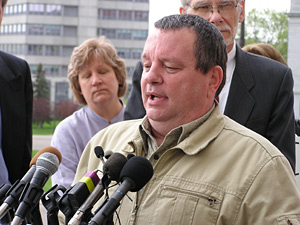Photos
More from MPR
| |||||||||||||||||||||||||||||||||||||
April 29, 2005
Over bitter objections from some Democrats, the Republican-controlled House approved an $8.1 billion health budget bill Friday that would eliminate public health insurance for at least 24,000 adults. The bill passed on a vote of 74-59.
St. Paul, Minn. — The legislation cuts deeper than Gov. Tim Pawlenty's proposal to remove 22,500 adults from state health programs, according to updated projections from the Department of Human Services. Most of the reductions would fall on childless adults who use the MinnesotaCare program.
Supporters of the bill say there are plenty of good things in it. Rep. Fran Bradley, R-Rochester, the chief author of the bill, said during floor debate that long-term-care facilities, group homes and care facilities for the mentally retarded will see an increase in funding.
Bradley says, Minnesota is still more generous than other states.
"It is pretty clear that no matter what the other forces, we have to do something about the rate of inflation in health care spending in our public health care programs. You can't sustain 19-percent growth, 20-percent growth every biennium," he said.
Bradley held out some hope that the cuts could be soothed if a state-sponsored casino is approved. He says the additional $20 million would expand enrollment in MinnesotaCare and other state health programs. But the casino measure was sent last week to the House Taxes Committee where it appears there are not enough votes to approve it.
Bradley's critics, however say his assessment of the rate of inflation in health care is misleading since the increase is over two years.
Rep. Tom Huntley, DFL-Duluth, says private health insurance is rising at a faster rate. He says MinnesotaCare cuts and payment cuts to hospitals would be a "double whammy" on the state's hospitals. He says those cut will still end up in the hospital, but only when they're really sick.
"I can tell you that if we eliminate 30,000 people from the rolls, they're not going to go away. They're still going to be living in the state of Minnesota, they'll still be going to the hospital and they'll still be treated," Huntley said.
Rep. Barb Goodwin, DFL-Columbia Heights, called the package a "piece of crap."
"There's no reason for anybody to vote for this bill," she said near the end of a floor debate that lasted more than five-and-a-half hours. "It's setting Minnesota back. It's putting Minnesota into the race to the bottom."
House DFLers have been pushing for a 50-cent-a-pack cigarette tax increase to pay for increased eligibility. Others proposed cuts to the Minnesota Department of Human Services private consulting contracts.
But House rules prevented them from proposing the changes because it would increase the final makeup of the health budget.
Earlier critics of the bill held a news conference with some MinnesotaCare recipients who would lose their coverage under the House bill. Some said they were concerned about how they would pay for their health care needs.
Duluth resident Alton Wood says he pays $50 a month to be eligible for the program and another $25 for prescription drug co-pays. Wood says he would be forced to pay $350 a month for his prescription drugs alone if the House bill becomes law.
"I already had a procedure with my heart. I had three stents put in. With MinnesotaCare, I'm able to afford that procedure and maintain the health that I'm needed with medications and whatnot," he said.
Others who spoke at the news conference said they support a cigarette tax increase to keep their health insurance.
In the Senate, DFLers are ready to pass a completely different budget when it comes up on the Senate floor on Monday. The Senate DFL budget would actually increase enrollment in state health programs. The problem is Senate DFLers haven't said how they would pay for their budget. The total Senate DFL budget is about a $1 billion more than the House bill.
Both Senate DFLers and House Republicans seem well entrenched in their beliefs and both say it will be hard to break the stalemate on the issue.
(The Associated Press contributed to this report)








